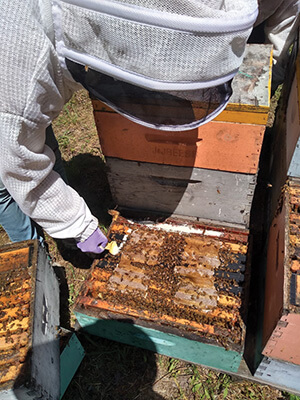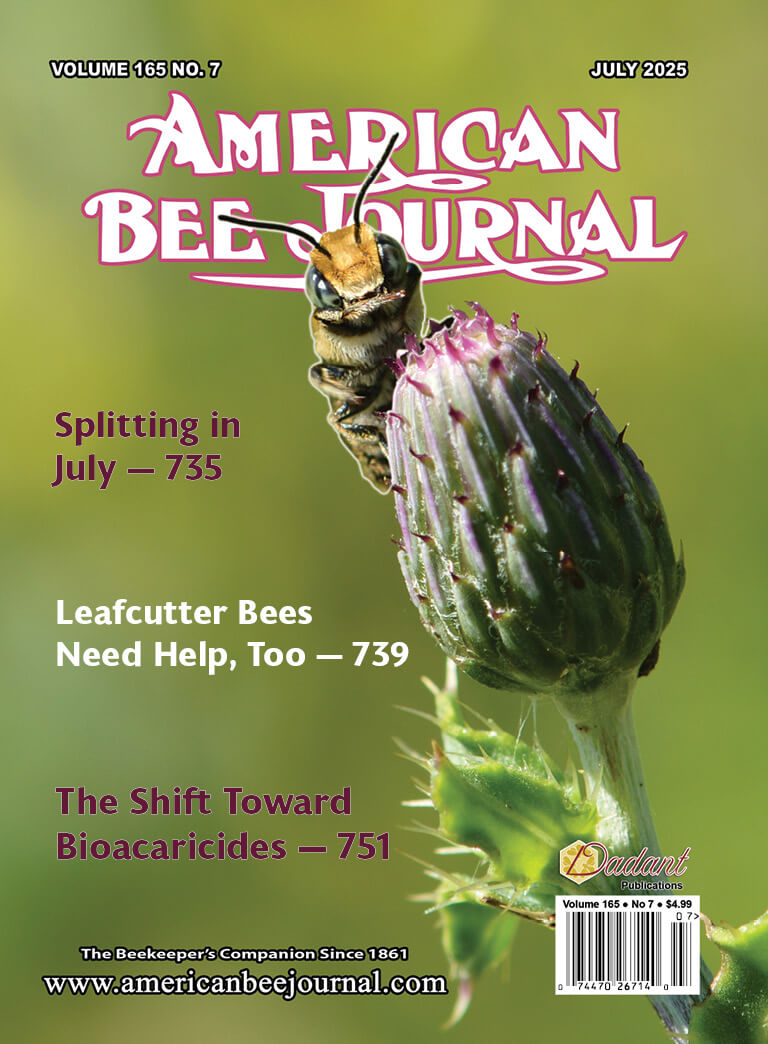
When my dog was due for a rabies vaccine, I took him to a veterinarian to get his shots. When I needed to sell some sheep to a farmer in Indiana, I called a veterinarian to get a health certificate. When my bees got sick, I never needed to call a veterinarian — until recently. Even though honey bees are animals that get sick, have nutritional issues, and need health certificates, honey bees in the United States historically haven’t been under veterinary care. However, in 2017, new federal regulations have brought veterinarians and beekeepers together for the first time. As a beekeeper, you should know how to work well with a veterinarian so that you can ensure that you have access to all the tools you need to keep your bees in their best health.
You really only need to work with a veterinarian if you need antibiotics. Right now, the role of veterinarians is very limited — they provide the paperwork so you can legally purchase antibiotics. If you don’t need antibiotics, you don’t need to find a veterinarian for your bees. Hopefully in the future, after more veterinarians get involved in honey bee care and more veterinary schools have honey bee programs, we will be able to call a vet with honey bee nutrition questions, or for recommendations on mite controls. But for now, their role is just to provide legal access to antibiotics. Health certificates will still be issued through your state apiarist, who usually works through the Department of Agriculture. Miticides, which are technically pesticides and not antibiotics, are still available for purchase directly from bee supply companies.
You need to have a relationship with the veterinarian first. Licensed veterinarians can only prescribe medications for animals with whom they have a veterinarian-client-patient relationship (VCPR). Most states use the federal definition of a VCPR, but some states will have even stricter requirements. The federal VCPR definition is below:
- A veterinarian has assumed the responsibility for making medical judgments regarding the health of (an) animal(s) and the need for medical treatment, and the client (the owner of the animal or animals or other caretaker) has agreed to follow the instructions of the veterinarian;
- There is sufficient knowledge of the animal(s) by the veterinarian to initiate at least a general or preliminary diagnosis of the medical condition of the animal(s); and
- The practicing veterinarian is readily available for follow-up in case of adverse reactions or failure of the regimen of therapy. Such a relationship can exist only when the veterinarian has recently seen and is personally acquainted with the keeping and care of the animal(s) by virtue of examination of the animal(s), and/or by medically appropriate and timely visits to the premises where the animal(s) are kept.
It is up to the veterinarian to make sure that the VCPR requirements are met. It is really important that you cooperate with them — if you ask a vet to prescribe an antibiotic without letting them get to know you and your bees, you are asking them to put their license at risk, so be reasonable, and make sure that they can put together a good file for their records. They don’t have to come out and inspect every hive, but they do need to know the basics of your operation: how many colonies you have, where those bees go, and how much knowledge you have as a beekeeper about bacterial diseases and antibiotics. If you already have a veterinarian for other animals, they may just need to talk to you about your bees and their needs. If the relationship is brand new, the veterinarian may have to come for a visit, talk with you, and see your bees before they feel comfortable writing an order for antibiotics. Once a relationship is established, the veterinarian will have more flexibility, and may be able to provide an order over the phone or email, depending on what is allowed in their state.
Your veterinarian does not have to be a bee expert. A veterinarian’s license covers them for all sorts of animals, and it is impossible for someone to be an expert in every species. While some veterinarians choose to specialize, their license is broader than their specialty. The license of your horse veterinarian also covers them to work with your dog, your pet bearded dragon, and your bees. When they are in veterinary school, vet students not only learn about animal health, but they also learn how to use good resources to find answers. If they don’t automatically know about the nutritional requirements for your bearded dragon, they will know where to look, and who to talk to. It isn’t important that your veterinarian understands swarm control, or can raise queens. They just need to be comfortable that when they write an order for antibiotics that it is in the best interest for you and your bees. There are more and more resources for veterinarians to learn about bee health, including online continuing education classes, and a best management practices document by the American Veterinary Medical Association.
There are many different types of beekeepers and many different types of veterinarians. A small hobby beekeeper may prefer to work with a small animal veterinarian who is used to working with cats, dogs, and other pets, and can provide each hive with individualized attention. A commercial beekeeper will likely be ….


